Is 'The Tattooist of Auschwitz' a True Story? What to Know
The powerful tale of “The Tattooist of Auschwitz” has captivated audiences since the book was published in 2018. Now, a new TV adaptation aims to tell the same resounding story.
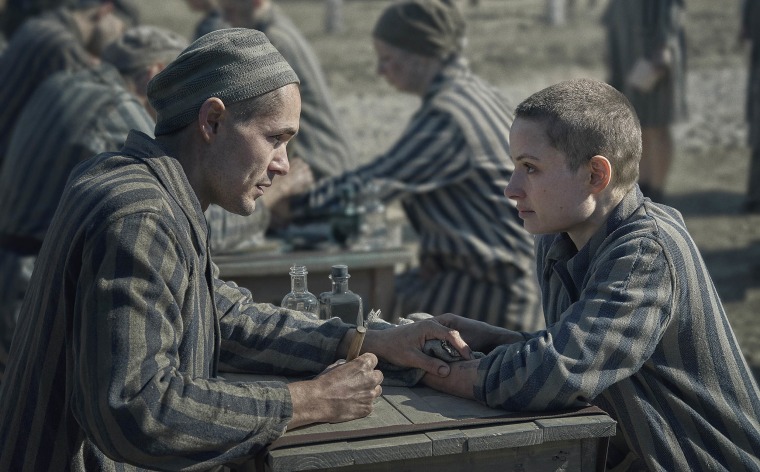
But is it a true story?
Though considered a novel, author Heather Morris says the book is based on the life of Lale Sokolov, a Slovakian Jew, who was a prisoner at Auschwitz concentration camp in 1942.
In the story, Lale, who also goes by Lali, garners the respect of fellow prisoners and some Nazi soldiers, landing him the coveted role of tätowierer — the tattooist — where he must mark those coming into the camp. While putting ink to arm, Lale meets Gita Furman, who immediately captures his heart, and a love story ensues.
Jonah Hauer-King as Lale, who goes by Lali, and Gita, played by Anna Próchniak, when their characters first meet.Martin Mlaka / Sky UKNow, the TV drama — starring Jonah Hauer-King, Harvey Keitel, Anna Próchniak and Melanie Lynskey — resurfaces this compelling tale on the small screen across six episodes, available to stream on Peacock May 2.
Here's a breakdown of how to interpret the reality of "The Tattooist of Auschwitz."
Is 'The Tattooist of Auschwitz' a true story?Morris included in the author’s notes section of the book that she wrote the story "based on the firsthand testimony" of Lale himself.
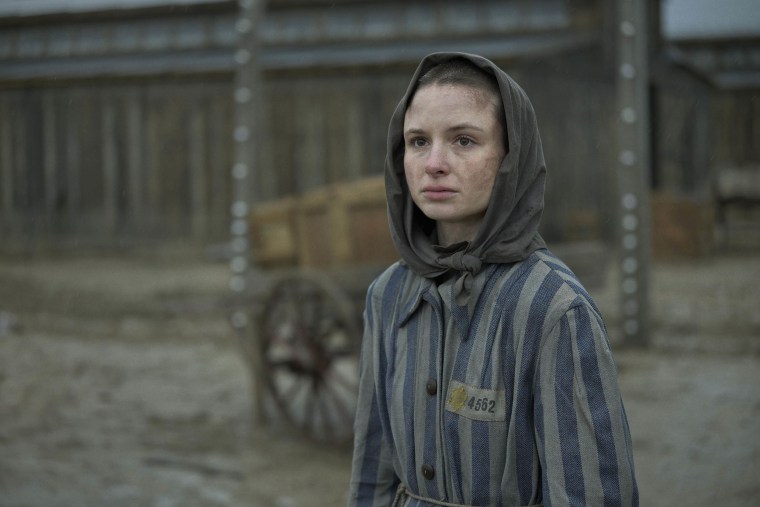
While she stated that the book is "not an authoritative record of the events of the Holocaust," she goes on to write "the events in this story occurred largely as described is not in doubt and the information presented as fact has been sourced and researched."
Anna Próchniak as Gita Furman in "The Tattooist of Auschwitz."Sky UK / Sky UKHarperCollins Publishers also noted in the first few pages of the book that it is categorized as fiction.
“References to real people, events, establishments, organizations, or locales are intended only to provide a sense of authenticity, and are used fictitiously,” the company wrote. “All other characters, and all incidents and dialogue, are drawn from the author’s imagination and are not to be construed as real.”
In a February 2018 interview with The Guardian, Morris said that 95% of the story "is as it happened; researched and confirmed."
"What has been fictionalised is where I’ve put Lale and Gita into events where really they weren’t," Morris told the outlet. "They weren’t together when the American planes flew over the camps, for example. Lale was on his own at that point. I put him and Gita together for dramatic licence.”
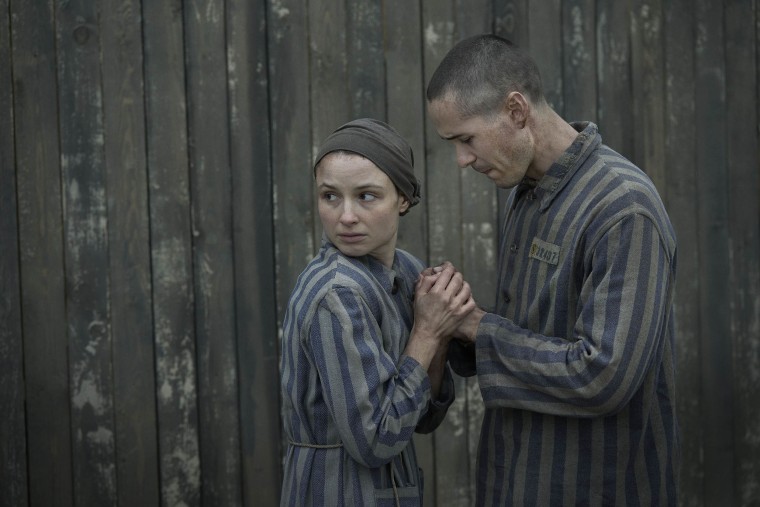
Morris also emphasized that Lale's tale is a love story. "I’m just trying to tell a simple love story. But one that stood the test of time," she said.
Months later, a report from the Auschwitz Memorial Research Centre was published, claiming that “the book contains numerous errors and information inconsistent with the facts, as well as exaggerations, misinterpretations and understatements.”
The report urged readers to look at the book as “an impression devoid of documentary value on the topic of Auschwitz, only inspired by authentic events," and took issue with details such as the route prisoners took to the camp, murders that occurred at Auschwitz and a relationship between a female Jewish prisoner and a high-ranking SS officer.
Gita, played by Anna Próchniak, and Lale, played by Jonah Hauer-King, share a moment in the TV series "The Tattooist of Auschwitz."Sky UK“The nature of human memory, especially where the events recalled occurred over 70 years ago, requires confrontation with other sources. From today’s perspective, we can only regret that no specialist in the area of camp matters was invited to work on the book,” the report concluded.
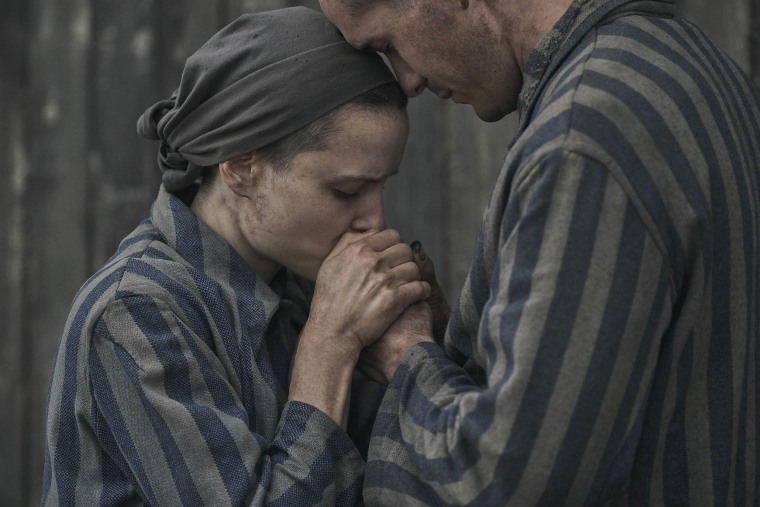
“Given the number of factual errors, therefore, this book cannot be recommended as a valuable title for persons who want to explore and understand the history of KL Auschwitz.”
When it comes to the 2024 TV series, a disclaimer in the beginning of each episode reads, “This series is inspired by ‘The Tattooist of Auschwitz’ and is based on the memories of Holocaust survivor Lali Sokolov.” A few seconds later, some of the text fades to just show “the memories of Lali Sokolov.”
How does the TV show compare to the book?Claire Mundell, executive producer of the TV adaptation of "The Tattooist of Auschwitz," recently spoke to TODAY.com and gave insight into how the show takes on Lale's account.
“It’s a drama," Mundell says. "For the purposes of the narrative, we sometimes have to make choices within the context of the way we tell the story, but it’s all inspired and based on Lali’s true recollections of his experience as told to Heather Morris."
Anna Próchniak's Gita and Jonah Hauer-King's Lale in "The Tattooist of Auschwitz."Sky UKMundell says that Lale's memory couldn't have been linear when retelling the events to Morris over the years.
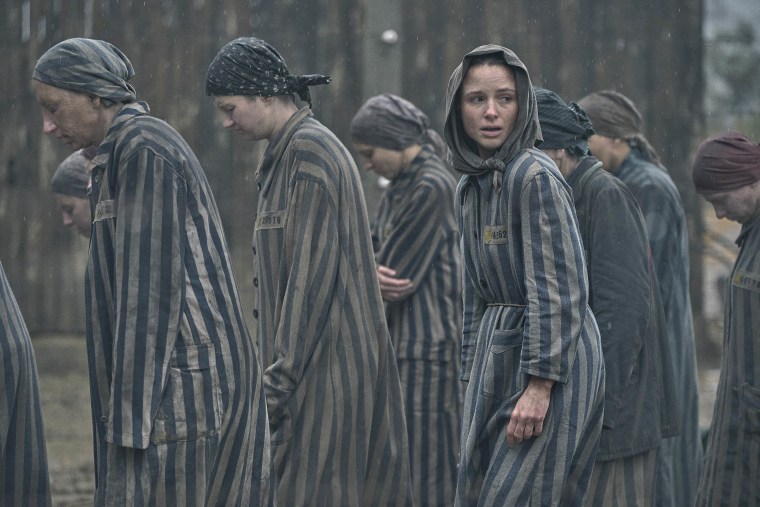
“It doesn’t come out in one form. (Morris) had to help (Lale) put together the things that had happened to him because he was a man still suffering from trauma 60 years later,” she adds. “And you see that in the way that we tell the story.”
Hauer-King, who plays Lale in his younger years, tells TODAY.com that the TV show's biggest deviation from the book is that a future Lale, played by Keitel, is shown recalling his memories from the Holocaust to Morris (Lynskey), and viewers see the retelling in the form of flashbacks.
“We wanted to draw out the telling of how Lali actually revealed his account to have in the book,” Hauer-King explains to TODAY.com. “It’s an epilogue (in the book), a three-page bit right at the end, but we felt that was such an important part of this.”
Gita (Anna Próchniak) walking with other women held as prisoners at Auschwitz.Sky UKIn the show, Lale tells Morris certain stories from his time at the Auschwitz concentration camp, and he appears to be plagued with shame, embarrassment and guilt, at times. Viewers then see flashbacks showing altered details to the story he just told, implying that Lale is either holding back at points or mixing up his narrative. In time, however, Lale seems to trust Morris more, naturally letting her into his honest past.

“I think it shone a light on his experiences in the camp, but also how it’s affected him over many decades and the trauma that he’s carried and how much that’s impacted his life," Hauer-King explains.
Mundell says their TV adaptation is based on Lale's account in the novel, as well as the Shoah testimonies and video interviews between Lale and Morris. The team also relied on a historical and cultural consultant.
All six episodes of "The Tattooist of Auschwitz" can now be streamed on Peacock, which is part of our parent company, NBCUniversal.
Becca Wood
Becca Wood is a news and trending reporter for TODAY Digital based in New York City. Follow her on Instagram and Twitter.



















































